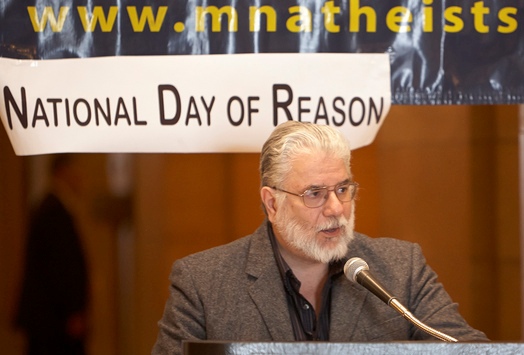By Grant Steves
 The following is a transcript of the speech written by Grant Steves and delivered by James Barri at the State Capital during the Day of Reason
The following is a transcript of the speech written by Grant Steves and delivered by James Barri at the State Capital during the Day of Reason
The Pledge of Allegiance is described as an oath, a national prayer, and a statement that elevates the government and flag to religious icons. Its major supporters have been clergy, religious and patriotic groups.
Francis Bellamy, who composed the original Pledge of allegiance in 1892, had these thoughts about it: The true reason for allegiance to the flag is the ‘republic for which it stands’. . . . And what does that vast thing, the Republic mean? It is the concise political word for the Nation—the one nation which the civil war was fought to prove. To make that one nation idea clear, we must specify that it is indivisible.
.In 1948 Louis Bowman, a chaplain, was the first to lead a group in saying the pledge with the inserted phrase “under God.” The Daughters of the American Revolution gave him an award as the originator of this phrase.
In 1951 the Knights of Columbus passed a resolution directing all their chapters to use the phrase “under God.”
In 1952 Louis Bowman’s idea was proposed to William Randolph Hearst—his papers started a campaign for this phrase to be inserted into the pledge.
Also in 1952 an influential religious leader and a founder of the National Prayer Breakfast, Mr. Holger Christian Langmack, had ongoing conversations with President Truman. But no legislation was acted upon.
On February 5, 1954, the Reverend George MacPherson Docherty at the Presbyterian Church in Washington, DC, delivered a sermon about injecting the phrase “under God” into the Pledge. In the audience that Sunday was President Eisenhower. Three days later Congressman Charles Oakman, a Republican from Michigan, introduced a bill injecting “under God” into the pledge. It became law on Flag Day, June 14, 1954, when President Eisenhower signed it into law with the following comments: From this day forward, the millions of our school children will daily proclaim in every city and town, every village and rural school house, the dedication of our nation and our people to the Almighty. . . . In this way we are reaffirming the transcendence of religious faith in America's heritage and future; in this way we shall constantly strengthen those spiritual weapons which forever will be our country's most powerful resource, in peace or in war.
Some have objected to saying any pledge and some have objected to the religious phrase of “under God.” The Pledge has captured the imagination of the majority in this country and they have reacted to the minority that objects by beating them, tar and feathering them, and castrating them.
So much for “liberty and justice for all.” The majority seems to ignore the Constitution that protects the minority’s right of freedom of speech and of and from religion. This is a controversy that will continue to cause dissent.
The Pledge may bind us to an indivisible nation under God, but the Constitution frees us from that binding.

